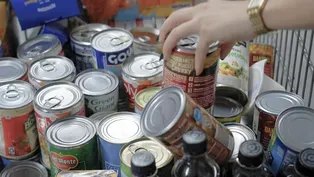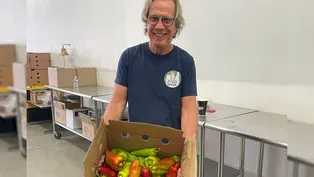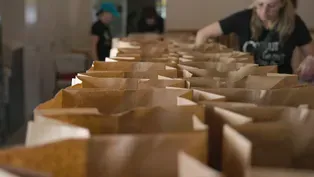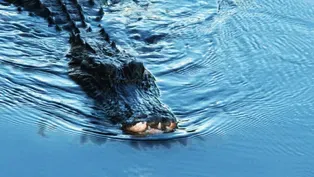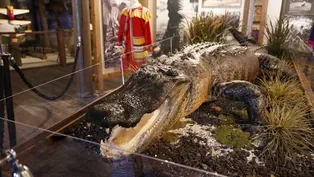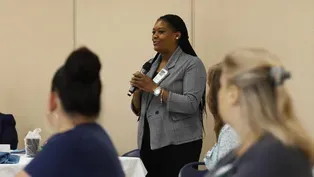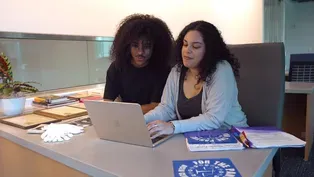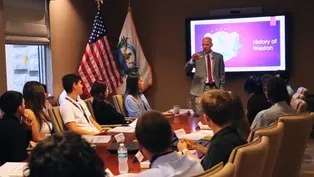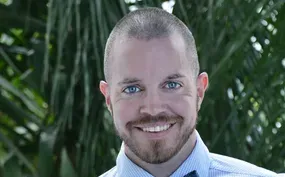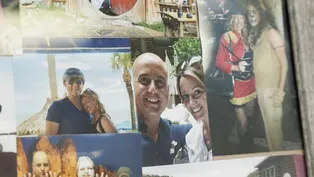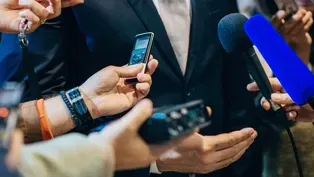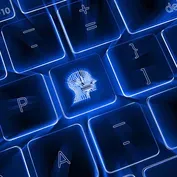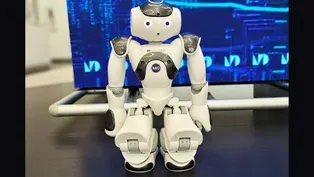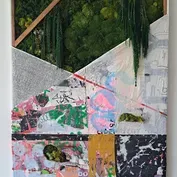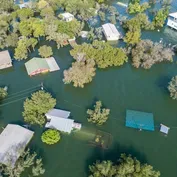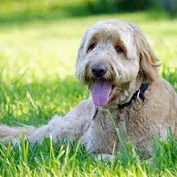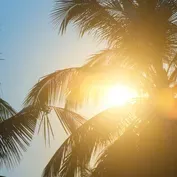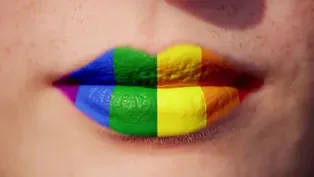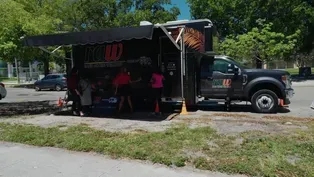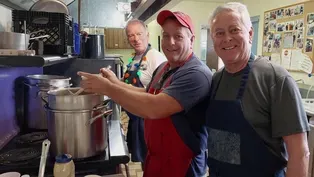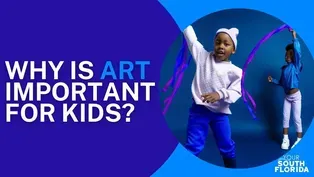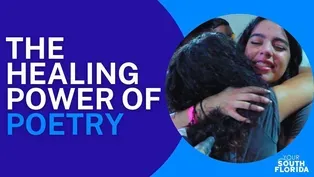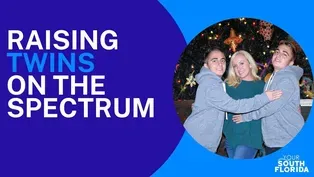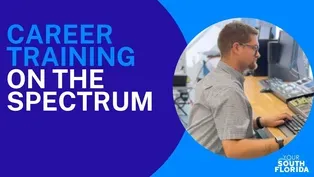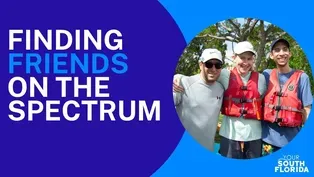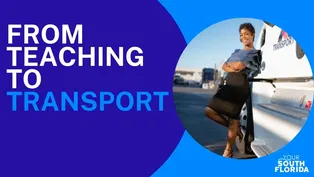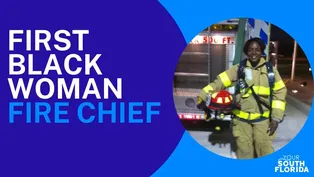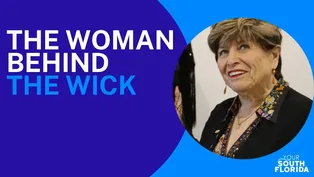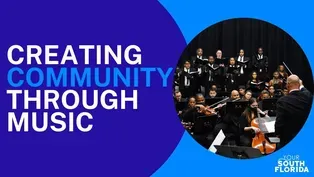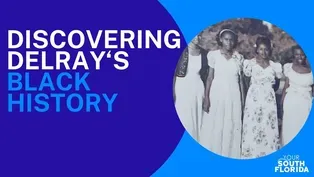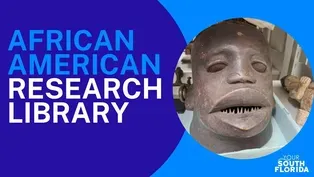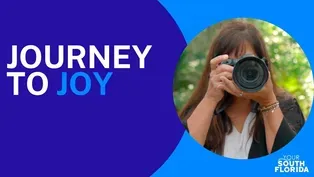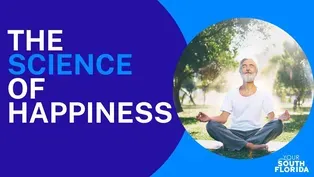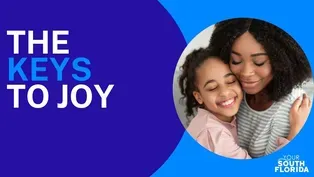Your South Florida
How The Arts Help Child Behavior
Clip: Season 8 | 11m 44sVideo has Closed Captions
Studies show that kids engaged in the arts have fewer problems interacting with others.
Exposing children to the arts offers their young minds more than just an appreciation to the creative world. Studies show that kids engaged in the arts have fewer problems with their peers, teachers and adults - and are less likely to develop depression. Prime Time of Palm Beach County, Inc. is putting this to practice through their work with out-of-school providers.
Problems with Closed Captions? Closed Captioning Feedback
Problems with Closed Captions? Closed Captioning Feedback
Your South Florida is a local public television program presented by WPBT
Your South Florida
How The Arts Help Child Behavior
Clip: Season 8 | 11m 44sVideo has Closed Captions
Exposing children to the arts offers their young minds more than just an appreciation to the creative world. Studies show that kids engaged in the arts have fewer problems with their peers, teachers and adults - and are less likely to develop depression. Prime Time of Palm Beach County, Inc. is putting this to practice through their work with out-of-school providers.
Problems with Closed Captions? Closed Captioning Feedback
How to Watch Your South Florida
Your South Florida is available to stream on pbs.org and the free PBS App, available on iPhone, Apple TV, Android TV, Android smartphones, Amazon Fire TV, Amazon Fire Tablet, Roku, Samsung Smart TV, and Vizio.
Providing Support for PBS.org
Learn Moreabout PBS online sponsorship(Arlene) Exposing children to the arts offers their young minds more than just an appreciation to the creative world.
Studies show that kids engaged in the arts have fewer problems with their peers, teachers, and adults, and are less likely to develop depression.
Joining me now to share more is Shabrae Jackson, professional development specialist with Prime Time Palm Beach County.
Shabrae is also an expressive arts educator and practitioner with Collective Tapestry and Sonja Kelly, founder and artistic director of Divinity Dance.
Thank you both so much for being here today.
Shabrae let's start with you.
What is prime time PBC and its mission?
Yeah, well, prime time Palm Beach County has been working for 23 years with after school programs and summer programs.
Specifically in looking at how can we work towards quality programming for youth.
And so we work across Palm Beach County working specifically to provide coaching, training, network events, even scholarships.
Anything that we can do in support of this important field.
(Arlene) And talk about your role with Prime time and, you know, how does it impact the providers you help?
(Shabrae) Yeah, well, I'm currently working with the professional development team, and our team specifically provides training.
So whether that's online or we also go into program sites as well and do site-based trainings and regional trainings.
And we do a lot of trainings across themes that are important for youth, youth, well-being and specifically skills that practitioners need within the program space.
(Arlene) Well, one of those providers here that gets help from prime time PBC is Divinity Dance, which I think is so cool.
Tell us how you work with prime time PBC and how you work with kids.
Wonderful.
Um, it's been a beautiful partnership since I've come on board with Prime Time in 2022.
Um, Divinity Dance was founded in 2005 as a literal leap of faith to serve our Palm Beach County community and provide equitable access to dance instruction.
And the partnership with Prime Time has allowed us to expand our reach to more schools and community organizations and faith-based organizations who have existing student populations.
And we bring dance enrichment and a whole lot of fun into those after school and summer spaces where typically there may not be arts programming, specifically dance as well, right?
(Arlene) And that can get also pricey.
And it's not always absolutely.
(Sonja) The beauty of the partnership is prime time through Children's Services Council provides the funding.
So we're able to offer this dance instruction at no cost to the schools and community organizations that we have the privilege to serve.
(Arlene) And that's such a beautiful thing.
And it's match made in heaven here with Shabrae.
Yes.
Tell us how you discovered divinity dance and how you connected and how you're able to help them as a provider.
Mhm.
Well, Prime Time has a process in which it works with its different providers, which is we really think about it as expanded learning opportunities.
And so apart from divinity dance we also work with Digital Vibes and Cox Science Center and Aquarium right.
So a number of different providers across the county and so there's a process.
We even have a whole team, community partnerships, that kind of works with our different providers in this way and bringing them in, connecting with them and then connecting them with the programs.
And so as, as Sonja mentioned, um, a lot of that, due to our support by the Children's Services Council of Palm Beach County, makes that possible in so many ways.
(Arlene) Right and not so much with support, you know, however you see it, you know, with getting them on.
But it's also continuing that support, you know, getting these great groups and then giving them that training and those tools.
So tell us specifically about that.
(Shabrae) Yeah.
So prime time we do provide different trainings for our different providers.
Some of that might be connected with how can you use your programs to cultivate empathy for example.
Or what does it look like to bring in the importance of rules and routines?
Right.
So there could be a number of themes that we work with them with, but also community partnership teams also brings in guest speakers as well, to help them to think about their own organization's growth and their own impact as well within the community.
So it's really also a partnership because we really see our providers as well as bringing in expert content, just like Sonya and Divinity dance like they are experts within that world of dance.
And so partnering with them, we can provide that for our practitioners and our programs.
(Arlene) That's so neat.
Yeah.
And how cute is it to see the kids out there doing their thing?
(Sonja) It is amazing because I see myself in them as well.
So it's a full 360 experience for me because that is where I learned to dance.
Not necessarily in a classically trained studio, but after school and community spaces is where my dance journey began.
So I look at it as I'm giving back and helping to form the next generation of movers in the space that started my professional journey.
(Arlene) Well, we.
Just love you Sonja, for that and what you do.
And thank you, you know, tell us about you both have experience with kids, younger children, students.
Who have been like all of us.
They have lived through Covid and all the limitations that Covid brings.
And they've suffered to some degree.
And we see it all the time.
Tell us how this impacts that.
(Sonja) Well, for sure, what Covid reminded us and showed us is that we were built for community.
Yes, we are not built and created to live in isolation, and the focus on just mental health and wellness really came to the forefront during Covid.
And so it's so important that we provide these type of programmings, specifically dance as an art form because it's socially based.
You know, you have the community in the classes, you have the opportunity to support each other, to encourage each other, to learn the choreography together.
And even though we're more connected digitally in this generation than any other generation, um, statistics and research show that we also have higher rates of depression and anxiety, and I believe that community is a cure for that.
(Arlene) And mental well-being is is so necessary to have these outlets, right?
Yes.
So tell me about the feedback you've received.
You know, both of you from people involved with divinity dance and prime time BBC.
(Shabrae) Well, I know one thing this came with in connection with Divinity dance of a practitioner who had shared that they had a student, um, who was dealing with a lot of frustration and I think strong emotions and really felt like they found a healthy outlet through Divinity dance.
Um, um, and I think that was so encouraging because I think, as Sonja was mentioning, there's such an importance, right, to have these types of spaces where youth can express, can can learn how to regulate through movement.
I love how you talked about this next generation of movers, because that's what that's what we need, right?
For our health and also for our world.
And so we love getting that type of feedback back from our practitioners because we're seeing how it really makes a difference.
(Arlene) Tell us a little bit more.
About your kids, Sonja.
You know what grades, what ages and what's their feedback.
And maybe just the change you see over some time with them.
Sure Um, most of the work that we do with prime time is school age children.
So it's typically grades K through eight, predominantly K through five.
And the students, I literally see them blossom over the course of our cohort.
So our classes are typically a 6 to 7 week cohort for one hour, where we come in and teach choreography, but also create a safe space for students to express themselves.
So in addition to the movement, we embed SEL social emotional learning concepts within the scope of the course.
And literally, as Shabrae said, we see students that maybe were a little more reserved.
Once we've created this atmosphere where it's safe to express yourself, they literally open up, contribute to the class, share their voice.
They have choices that they can make, and that's something with the professional development team that they've helped us with as well, creating student voice and choice within the dance class.
And it's just it's just beautiful to see.
And the parents, I'm sure, give you such great feedback too.
Because oftentimes within the school setting, all schools do not have a formal arts program, and very few schools throughout the county have a dance program, and some of the dance programs are more structured towards a professional route versus a recreational space for students to express themselves.
(Arlene) and dance specifically.
Tell me how that really hones in on the mental wellbeing.
What is it specifically about dance?
(Sonja) Well, there's my personal belief, as well as what science has shown us.
So personally, when you're in dance versus some other art forms, it's not done in isolation.
So you're building the peer to peer relationships, you're learning about spatial awareness and how to work together and collaborate.
And then there's the scientific research that supports the release of our feel-good hormones, serotonin.
And, you know, that literally is chemically happening in our bodies when we're moving and engaging with others.
(Arlene) Speaking of this type of expression and expressive arts, you can tell me more about that.
You're actually an expressive arts educator.
That might be confusing for some of us.
Yes.
Break that down.
(Shabrae) Sure.
Yeah.
So the expressive arts is a field within the creative therapies and specifically in the expressive arts work.
We work with all of the art modalities.
So whether it's visual arts or poetry or music or movement and dance, theater, drama, we work with all of the arts and we work with them in a intermodal or some might say multimodal way in which we might move from dance towards poetry.
So we're kind of moving between the different arts.
You don't have to be an artist to work within the expressive arts, because it's really about the expression and it's about, um, the process and not necessarily the end product.
And that's why it is a wonderful therapeutic framework as well.
(Arlene) And tell us about Collective Tapestry that you are an expressive arts educator for that group, which is different than prime time BBC.
Yeah.
Tell us more about that.
(Shabrae) Sure.
So Collective Tapestry is a nonprofit organization, and we work with groups and organizations, individuals, to provide training on trauma informed care, but through the arts.
And so we use the expressive arts as part of our framework, which works with all of the arts.
And we work with community leaders, artists groups, even organizations like Divinity dance in some sense, and connecting the neuroscience and the psychoeducation with why the arts are healing and helpful for mental health and wellbeing.
And so that's a lot of the work that we do.
And we always have different projects that we have going on nationally, and we also have partnerships internationally as well that are in movement.
(Arlene) And how do people participate and how can they find out more about Collective tapestry?
(Shabrae) Yeah, well, they can definitely check out our website, Collective Tapestry.Org.
And we will have some maybe upcoming workshops and opportunities coming up in the fall and in August after the summer months.
And so they can check those out specifically trainings.
If you're looking for toolkits and manuals that you can use in your spaces to work with youth and also adults, this might be a good spot to to check out.
(Arlene) This is a good for groups who provide mental wellbeing and those types of services to the public.
(Shabrae) Yes, exactly.
And we do offer workshops as well.
If somebody also wants to do some of their own inner work or exploration, they can also participate in that as well.
(Arlene) Thanks for everything both of you do.
Shabrae Sonja.
Thank you, thank you.
Thank you so.
Much.
Support & Food for Broward Seniors and Grandfamilies in Need
Video has Closed Captions
In Broward County, many seniors are facing food insecurity. (7m 51s)
Palm Beach County Food Bank’s Critical Role in Fighting Food Insecurity
Video has Closed Captions
The PBC Food Bank works to provide nutritious meals and vital support. (9m 26s)
How Rescuing Food Supports Families & Fights Climate Change
Video has Closed Captions
Each year, millions of pounds of food are wasted while many South Floridians face hunger. (9m 57s)
Protecting the Everglades with the Miccosukee Tribe
Video has Closed Captions
For the Miccosukee Tribe, the Everglades is more than just land; it’s a vital part of their identity (8m 32s)
Inside Miccosukee Culture & History
Video has Closed Captions
Pam Giganti interviews William ‘Popeye’ Osceola and Talbert Cypress about the Tribe’s history. (11m 10s)
Transforming The Glades Through Leadership and Community Engagement
Video has Closed Captions
A program by the Belle Glade Chamber of Commerce brings people together to address community issues. (7m 16s)
How FIU Honors Mayor Ferré’s Legacy
Video has Closed Captions
FIU’s Maurice A. Ferré Institute for Civic Leadership helps to create a more engaged community. (8m 4s)
Go Inside the Program Turning High Schoolers Into Civic Game-Changers
Video has Closed Captions
The City of Weston is educating high school students about the inner workings of local government. (7m 56s)
Spotting Suicide Warning Signs: What You Need to Know to Help Someone in Crisis
Video has Closed Captions
Alan Mednick joins us in studio to share how to talk about the warning signs for suicide. (9m 18s)
From Darkness to Light: A Journey to Self-Acceptance & Mental Wellness
Video has Closed Captions
Watch the inspiring story of Caiden Smith's journey to self-Acceptance & mental wellness. (8m 13s)
Emotional Support & Resources for Loved Ones Left Behind After Suicide
Video has Closed Captions
The aftermath of a suicide can be an overwhelming and traumatic experience for those left behind. (8m 8s)
TIPS to Navigate AI Tech in Media
Video has Closed Captions
Susan Jacobson gives us her take on the role of AI in the industry and tips for students. (9m 39s)
FAU Researchers Test AI Limits & Risks
Video has Closed Captions
FAU students & researchers are using the power of AI to develop innovative ways to study the brain. (10m 13s)
Discover the Latest AI Programs @ Miami Dade College
Video has Closed Captions
Miami Dade College is diving head-first into AI with programs for all interest levels. (7m 49s)
Video has Closed Captions
Trees are vital to keeping our neighborhoods cool. (7m 7s)
Video has Closed Captions
The threat of flooding is becoming the new normal in South Florida, well outside of Hurricane Season (12m 25s)
Video has Closed Captions
As temperatures rise, it’s important to protect your pets too. (3m 40s)
Video has Closed Captions
Prolonged exposure to extreme heat poses many health risks. (4m 48s)
New Magazine Creates Stronger Community for South Florida's LGBTQ+ Women
Video has Closed Captions
Women owned SkirtSoFLo is a new magazine made for the South Florida LGBTQ+ women’s community. (6m 7s)
Mobile Units Brings Life-Saving HIV Healthcare into At-Risk Communities
Doctors from the University of Miami are creating more equitable approaches to HIV prevention & care (12m 44s)
A Beacon of Hope for Ft. Lauderdale's LGBTQ+ Community
Video has Closed Captions
For 70 years the Church of Christ Fort Lauderdale has been known for its inclusivity. (7m 2s)
How The Arts Help Child Behavior
Video has Closed Captions
Studies show that kids engaged in the arts have fewer problems interacting with others. (11m 44s)
How Poetry Can Provide Comfort and Boost Your Mood
Video has Closed Captions
Research shows that poetry can provide comfort and boost mood during periods of stress and trauma. (8m 13s)
Single Mom Gives Hope to Autism Families & TIPS to Navigate Resources l Your South Florida
Video has Closed Captions
Mom Candi Spitz knows all about the difficulties in navigating autism resources. (7m 35s)
New Higher Ed Program Gives Students with Autism a Chance at Independence l Your South Florida
Video has Closed Captions
Many adults with autism face significant barriers to finding gainful employment. (7m 27s)
Creating Safe Spaces & Friendships for Adults with Autism l Your South Florida
Video has Closed Captions
The Social Cog is creating safe spaces for young adults on the autism spectrum. (10m 51s)
Transporter Trudie Ives Talks Business & Helping Women
Video has Closed Captions
Trudie Ives discovered the world of transportation and hasn’t looked back. (9m 41s)
Fire Chief Trailblazer Samantha Whitehorne
Video has Closed Captions
Samantha Whitehorne is a fire chief for the Broward Sheriff’s Office. Watch her story. (6m 29s)
Backstage at THE WICK with Business Maven Marilynn Wick
Video has Closed Captions
Marilynn Wick has spent her life blazing a trail in the business world. (7m 43s)
Showcasing Classical Music from the African Diaspora
Video has Closed Captions
In 2021, Portia Dunkley co-founded the New Canon Chamber Collective. (11m 18s)
African American Research Library and Cultural Center
Video has Closed Captions
Take a tour of Broward County’s African American Research Library and Cultural Center. (7m 40s)
Local Photographer Shares Her Journey to Finding Joy
Video has Closed Captions
Sonya Prather set off on a journey of self-discovery that has enabled her to find true joy (7m 14s)
Happiness Coach Rob Mack on Positive Psychology & Happiness
Video has Closed Captions
Author Robert Mack and host Arlene Borenstein discuss Positive Psychology. (9m 37s)
Expert TIPS to Finding Your Joy from Author Lisa McCourt
Video has Closed Captions
Author Lisa McCourt gives tips to finding true joy in your life. (11m 11s)
Providing Support for PBS.org
Learn Moreabout PBS online sponsorshipSupport for PBS provided by:
Your South Florida is a local public television program presented by WPBT
